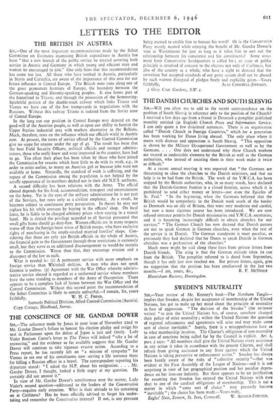THE DANISH CHURCHES AND SOUTH SLESVIG SIR,—Will you allow me
to add to the recent correspondence on the problem of South Slesvig in reference only to the position of the Church? I received a few days ago from a friend in Denmark a pamphlet published monthly entitled (in English) Church Press and Information Service. I can only quote a few disjointed sentences. There is an organisation called "Danish Church in Foreign Countries," which for a generation has been working for Danes living abroad. The only place where it meets with distrust and opposition is South Slesvig. "This opposition is shown by the Military Occupational Government as well as by the Germans. . . . One does not understand why these Church workers are treated as undesirable elements by the British as well as the German authorities, who instead of assisting them in their work make it twice as difficult."
At a recent annual meeting it was reported that "the Germans are threatening to close the churches to the Danish ministers, and that no help is to be had from the British. The work of the Y.W.C.A. has been stopped by the British authorities, who, in so many words, have declared that the Danish-German frontier is a closed frontier, across which it is prohibited to send either money or letters—not even the Epistles of St. Paul." "In the beginning, when the Germans believed that the British would be sympathetic to the Danish work south of the border as Denmark was an ally of Britain, they were very moderate and careful, but now a more rigorous course has been introduced. We are now refused entrance permits for Danish missionaries and Y.W.C.A. secretaries, and it is becoming increasingly difficult to obtain churches for our services." "The German Church has now decreed that Danish pastors are not to speak German in German churches, even when the rest of the service is in Danish. The German standpoint is most peculiar, as previously they had declared that for Danes to speak Danish in German churches was a profanation of the churches."
Much more might be said along these lines from private letters from Danish friends. The sting is that the German attitude takes its cue from the British. The pamphlet referred to is dated from September, though it has only just now reached me. But private letters, again, give no suggestion that the position has been ameliorated in the last two
months.—I am, yours, &c., R. F. MCNEILE. Bluntisham Rectory, Huntingdon.


































 Previous page
Previous page